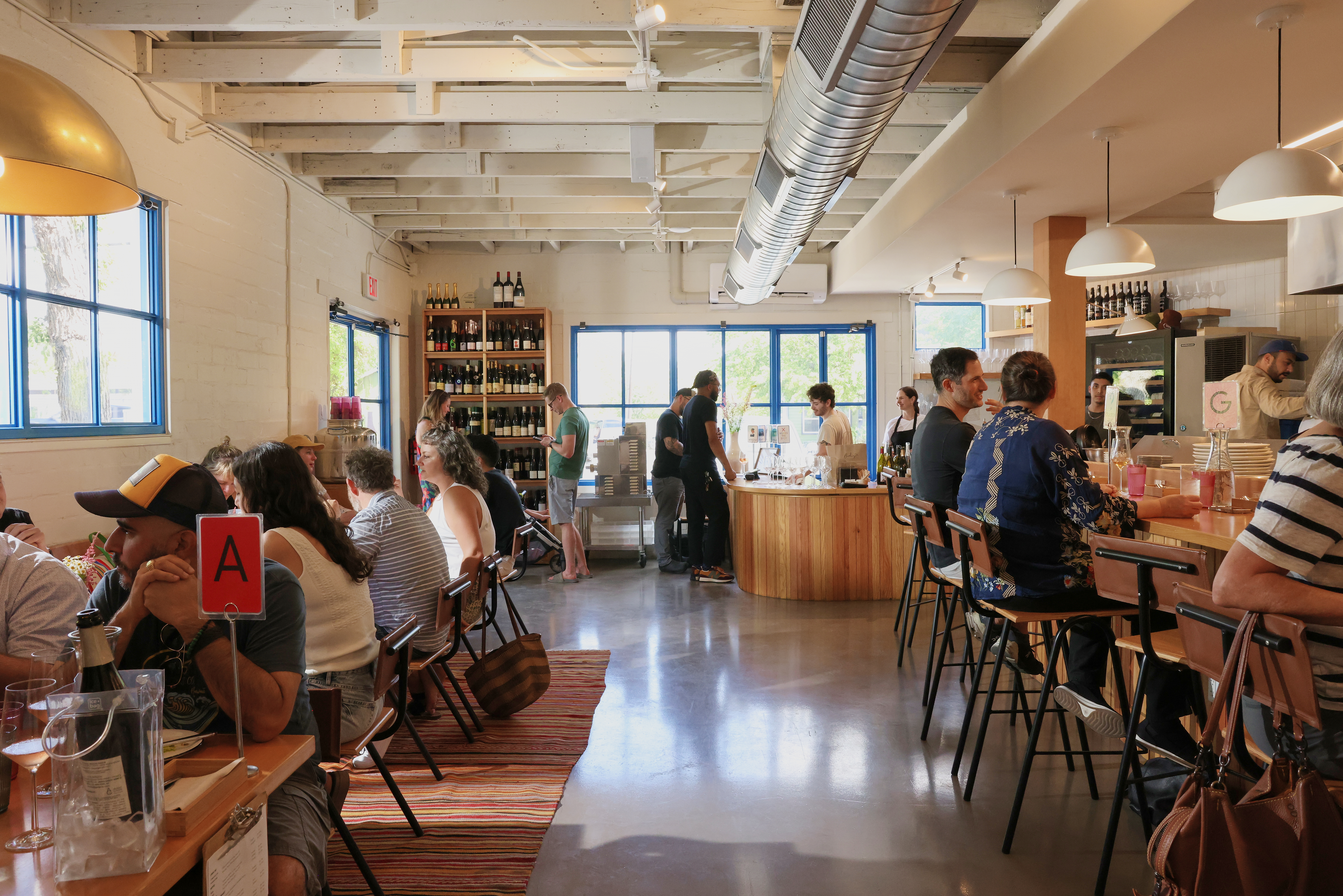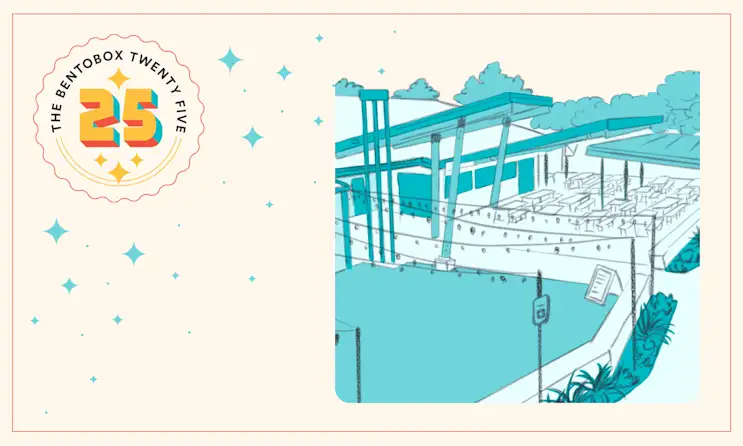Hospitality Now
The Birth of Fine Casual: Birdie’s Breaks the Mold in Austin
April 25, 2023
How do you offer employees family leave, health insurance, and paid vacation? Easy. Invent a new kind of restaurant.
“A lot of the cultural issues we’ve been talking about in restaurants over the last few years are really symptoms of pressure. Financial pressure due to razor-thin margins.” Arjav Ezekiel speaks confidently, like a man on the other side of a revelation. He’s taking a break from prepping for evening service at Birdie’s, the restaurant in East Austin he founded and owns with his wife, Chef Tracy Malechek.
“Tracy and I felt like COVID was an opportunity for a reset. We said, OK, the only way we’re going to shift this mindset is if we build a restaurant that’s really healthy. Then we can say things like, You know what: We’re going to close for one month a year. We’re giving people paid vacation and health insurance and family leave. But you can’t do that if the business isn’t healthy.”
In a few hours, this dining room will be at full throttle: music up, customers laughing, the line to get a table snaking around the block. The picture of restaurant health, you might think. But the crowds and the queue aren’t the reason Birdie’s is resetting the standards of the restaurant industry. Birdie’s is the product of a conscious effort to reimagine fine dining from the ground up — by prioritizing the health and happiness of the staff before anything else.

Hello, Birdie
Tracy and Arjav met in New York City in 2015 when they were part of the opening day crew at Untitled, Union Square Hospitality’s concept in the Whitney Museum. (She was the sous chef, he was the dining room manager.) In 2018, the year of their wedding, the couple relocated to Austin with the intention of opening an Italian restaurant. They took time to understand the city and its dining scene, finally signing a lease in March 2020 — two weeks before COVID hit.
“We ended up having to renegotiate the lease and spent that time asking ourselves some big questions,” Arjav recalls. “We sat down and reassessed the business model.”
I think the future of the dining room is going to focus on value-adds. The days of captains, and servers, and front waiters, and back waiters — that system is no longer sustainable.
Rather than imitate the fine dining model they’d worked in for years, Tracy and Arjav decided to reconceptualize their restaurant from a new starting point: What kind of business would they want to manage every day?
“We knew the only way we would want to be there every night was by having the restaurant close two days a week. We knew we needed vacations and to spend holidays with family. Then we decided that if we're going to do it for ourselves, we wanted to do it for everybody.”
From there, the business started taking shape. It would prioritize supporting employees, who would work manageable schedules, alongside the superior food and wine that Tracy and Arjav cared about.

Value-add, not overhead
To create the kind of environment they wanted, the business needed to make sure its margins were in a good spot. That meant deciding which parts of traditional fine dining to keep and discard.
“I think the future of the dining room is going to focus on value-adds,” Arjav says. “The days of captains, and servers, and front waiters, and back waiters — that system is no longer sustainable. We have a flat system where everybody is cross-trained on everything, so your server can be your sommelier and the person at the counter can talk you through the menu.”
At Birdie’s, everything is human-sized. Tracy creates the ever-changing menu based on which ingredients she’s gotten from her farm suppliers and even the weather that day. In the dining room, guests order at a counter, get a number, and sit at a table. Food is run out to them by a small team of servers, each of them highly knowledgeable about the menu. The atmosphere is luxe yet informal.
“I think it’s a great product,” reflects Arjav of his “fine casual” service model. “There’s discipline, but we have fun. Tracy’s food is really joyful.
“Basically, we treat it like a house party we’re throwing. That’s part of the reason Tracy and I are there every day.”
Offer the benefits you’d want yourself
With costs under control, Birdie’s is able to pass more revenue to employees. “When we saw what was happening with labor prices, we had to skate to the puck a little bit,” Arjav says. “We wanted to build a restaurant that could thrive now and survive when those inevitable pressures come down the line.”
One plank in Birdie’s model is an equitable comp system. Each week, tips get pooled and divided by the number of hours an employee worked. “The dishwashers get tipped out the same amount as the counter, the cook, and the server,” Arjav says.
But the benefits are what truly set Birdie’s apart as an employer. Partly subsidized by a 3.5% health and wellness fee on every check — which is proudly advertised on their website — Birdie’s is able to provide health insurance, subsidized mental health care and therapy, and their newest benefit, paid family leave for two months.
Plus, the whole restaurant staff gets four weeks of vacation per year. “Two weeks every summer and two weeks every winter,” Arjav states. “We pay people for that time off.”
Building a resilient restaurant
Arjav views a healthy work environment like his as the way forward for any restaurant in our new world of high inflation and elusive labor. “But it’s less about retention than just building the life we wanted,” he adds.
Tracy and Arjav did what they set out to do. They created a fun neighborhood restaurant with elevated food and wine and service, and they’re doing it while providing a sustainable environment for workers and management alike. If the business model catches on, in Austin or elsewhere, Arjav is perfectly fine with that.
“If ten years from now, the restaurant scene in Austin has some of the cooks and dining room people who have come through Birdie’s adding value to the city, because they’ve learned good habits and learned how to build a culture, I think that’ll tell us we’ve been the kind of restaurant we hope to be.”
Visit Birdie's online at birdiesaustin.com.

BentoBox Marketing & Commerce Platform
Deliver Smarter Hospitality
Want to stand out online, bring in more money, engage your diners, and streamline operations?
Recommended

Community
How North Carolina Became a Restaurant Powerhouse
June 24, 2024
The Tar Heel State is the nation’s fourth-biggest for new restaurant openings despite being ninth biggest in terms of population. Here’s what’s behind the growth.

The BentoBox 25
Supporting Women in Hospitality with Chef Elena Reygadas
May 14, 2024
Beyond shaping the city’s food scene at restaurants like Rosetta, the CDMX native has been an outspoken advocate for women pursuing culinary careers.

The BentoBox 25
Lewis Barbecue Brings High-Touch Hospitality to Texas BBQ
May 14, 2024
How the Charleston, SC restaurant group brings authentic Texas BBQ to a new environment.

